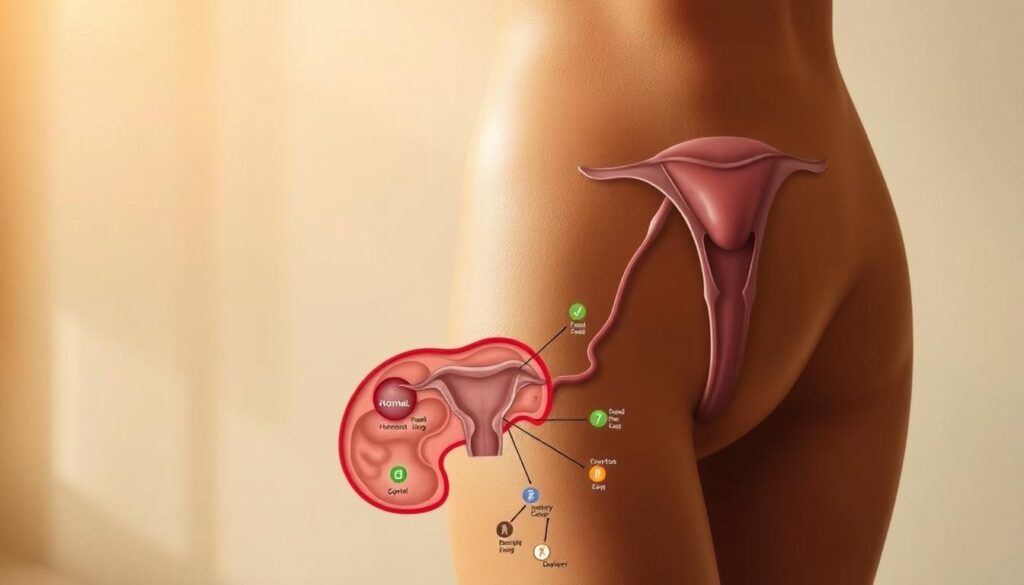Are you tired of feeling like your body is out of sync? Do you struggle with fatigue, mood swings, or reproductive concerns that seem to appear out of nowhere? The answer may lie in the delicate balance of your hormones.
Hormones play a crucial role in regulating various bodily functions, from metabolism and sleep to mood regulation and reproductive health. Discover the Secrets to Hormonal Wellness When your hormones are in balance, you feel energized, focused, and ready to take on the day. But when they’re out of balance, it can be challenging to maintain your overall wellness.
We will explore the intricate world of hormonal balance and provide you with actionable strategies to achieve optimal balance in your body. By understanding the complex interplay of hormones, you can take proactive steps toward achieving lasting hormonal wellness.
Key Takeaways
Understand the role of hormones in regulating bodily functions.
Recognize the signs and symptoms of hormonal imbalances.
Discover evidence-based strategies to restore hormonal harmony.
Learn how to support your body’s hormonal system for optimal functioning.
Take proactive steps toward achieving lasting hormonal wellness.
The Powerful Impact of Hormones on Women’s Health
The complex interplay of hormones in the female body is essential for maintaining health. Hormones function as a sophisticated system, with each hormone playing a specific role in overall health and wellness.
Understanding the Hormone Symphony in Your Body
The endocrine system produces hormones that travel through the bloodstream to tissues and organs, controlling processes like metabolism, growth, mood, and reproductive cycles. The interplay between estrogen, progesterone, testosterone, thyroid hormones, and cortisol creates a delicate balance that, when disrupted, can lead to numerous health challenges.
| Hormone | Primary Functions | Impact on Women’s Health |
|---|---|---|
| Estrogen | Regulates reproductive cycle, maintains bone density | Influences mood, cardiovascular health |
| Progesterone | Prepares uterus for pregnancy, regulates menstrual cycle | Affects mood, sleep patterns |
| Cortisol | Responds to stress, regulates blood sugar | Impacts mood, energy levels |
Why Women Experience More Hormonal Fluctuations
Women’s bodies are designed to experience significant hormonal shifts throughout their lives, from puberty through reproductive years and into menopause. Unlike men, women experience cyclical hormonal fluctuations with their menstrual cycles, creating a complex hormonal landscape.
Understanding this hormonal symphony helps women recognize how these chemical messengers influence their daily lives and long-term health outcomes. Research shows that women’s brains are particularly responsive to hormonal shifts, explaining why mood and cognitive changes often accompany hormonal fluctuations.
Recognizing the Signs of Hormonal Imbalance

Hormonal fluctuations can lead to a range of symptoms that women should be aware of to take control of their health and wellness. As we navigate different life stages, our bodies undergo various changes that can signal hormonal imbalances.
Physical Symptoms That Shouldn’t Be Ignored
Physical symptoms are often the first indicators of hormonal issues. These can include unexplained weight changes, persistent fatigue, disrupted sleep patterns, and irregular menstrual cycles. During pregnancy or menopause, women may experience more pronounced symptoms like hot flashes, night sweats, and vaginal dryness. It’s essential to track these symptoms to understand their connection to hormonal fluctuations.
Mental and Emotional Effects of Hormone Fluctuations
Hormonal imbalances can also have profound effects on mental and emotional wellbeing, leading to mood swings, anxiety, depression, and irritability. Many women describe feeling “not like themselves” during these periods, experiencing changes that affect their quality of life. Recognizing these signs is crucial for seeking appropriate care and restoring balance to our overall health.
The Science Behind Women’s Health and Hormonal Wellness
The science behind hormonal wellness in women is multifaceted, involving a delicate balance of hormones that impact health and well-being. Hormones play a crucial role in regulating various bodily functions, from reproductive processes to overall physiological health.
Key Hormones That Regulate Female Health
Several key hormones regulate female health, including estrogen, progesterone, testosterone, thyroid hormones, and cortisol. Estrogen, often considered the primary female hormone, not only regulates reproductive function but also affects brain health, bone density, and cardiovascular health. Progesterone works in balance with estrogen to regulate menstrual cycles and pregnancy. Testosterone, though present in smaller amounts, is crucial for energy levels, libido, and muscle mass maintenance.
- Estrogen influences brain health, bone density, and cardiovascular function.
- Progesterone regulates menstrual cycles and pregnancy, impacting mood and sleep quality.
- Testosterone plays a role in energy levels, libido, and muscle mass.
- Thyroid hormones regulate metabolism and energy production.
- Cortisol manages stress responses, significantly impacting overall health.
How Hormonal Changes Affect Different Life Stages
Hormonal changes are a natural part of various life stages, from puberty through the reproductive years and into menopause. During puberty, the rise in hormone production triggers physical development and the onset of menstrual cycles. Pregnancy represents a significant hormonal shift, with levels rising to support fetal development. Perimenopause and menopause mark another transition as reproductive hormone production declines, leading to various physical and emotional changes.
“The brain can adjust and be okay with either high hormones or low hormones,” states Dr. Hermann. “Where it gets into trouble is when the hormones are changing all the time.”
Understanding these changes is crucial for maintaining hormonal balance and overall health throughout a woman’s life.
Common Hormonal Conditions Affecting Women

Hormonal imbalances can lead to several common conditions that affect women, impacting their overall health. These conditions can manifest at various stages of life, from menstruation to menopause, and beyond.
Premenstrual Syndrome and PMDD
Premenstrual Syndrome (PMS) affects up to 75% of menstruating women, causing symptoms like bloating, breast tenderness, and mood changes. A more severe form, Premenstrual Dysphoric Disorder (PMDD), can significantly impact a woman’s quality of life with debilitating emotional symptoms.
Perimenopause and Menopause Transitions
Perimenopause, which can last 4-8 years, is characterized by irregular periods, sleep disturbances, and the onset of hot flashes. Menopause, marked by 12 consecutive months without menstruation, brings changes like night sweats, sleep disruption, and mood changes.
Thyroid Disorders and Their Impact
Thyroid disorders are more common in women, with hypothyroidism causing fatigue and depression, while hyperthyroidism leads to anxiety and weight loss. Understanding these conditions helps women identify potential hormonal imbalance issues earlier.
Recognizing these common hormonal conditions is crucial for women’s health. By understanding the symptoms and effects of these conditions, women can seek appropriate care to manage their health and improve their quality of life.
Medical Approaches to Restore Hormonal Balance
Effective management of hormonal health involves a range of medical strategies tailored to individual needs. Restoring balance requires a comprehensive understanding of the underlying causes of hormonal imbalances.
Comprehensive Hormone Testing Options
Modern medicine offers various approaches to diagnose and treat hormonal imbalances, beginning with comprehensive testing to establish baseline hormone levels and identify specific imbalances. Blood, saliva, and urine testing provide different insights into hormonal function.
Hormone Replacement Therapy: Benefits and Considerations
Hormone replacement therapy (HRT) remains one of the most effective treatments for severe menopausal symptoms, offering relief from hot flashes, night sweats, mood disturbances, and protection against bone loss. The benefits of hormone therapy must be weighed against potential risks.
Personalized Treatment Plans for Optimal Results
The most successful treatment plans are personalized to the individual woman’s symptoms, health history, lifestyle, and preferences, often combining multiple approaches for optimal results. Regular monitoring and adjustment of treatment plans is essential to maintain hormonal balance.
Natural Strategies for Hormonal Wellness

Embracing a holistic approach to health can significantly impact hormonal wellness by incorporating nutrition, physical activity, and stress reduction techniques. This comprehensive strategy supports the body’s innate ability to maintain hormonal balance.
Nutrition Essentials for Hormone Health
A diet rich in whole foods, including fruits, vegetables, and healthy fats, plays a crucial role in supporting hormone production and regulation. Cruciferous vegetables, for instance, support estrogen metabolism, while healthy fats provide the building blocks for hormone production. Minimizing processed foods and excess sugar is also essential for maintaining hormonal balance.
Exercise Routines That Balance Hormones
Regular exercise is vital for improving insulin sensitivity, reducing cortisol levels, and supporting thyroid function. Different types of exercise, such as strength training and moderate cardio, affect hormones in unique ways, optimizing estrogen and progesterone balance. Engaging in physical activity that you enjoy can help maintain hormonal health.
Stress Management Techniques for Hormonal Harmony
Chronic stress can disrupt hormonal systems by triggering excessive cortisol production. Practicing stress management techniques like meditation, deep breathing, and mindfulness is essential for maintaining hormonal harmony. These practices help in regulating cortisol levels and supporting overall wellness.
By integrating these natural strategies into daily life, women can better support their hormonal health, leading to an improved quality of life and overall health and wellness.
Supplements and Products for Hormonal Support
To support hormonal balance, it’s essential to consider the role of high-quality supplements and products. Certain nutrients and herbs have been shown to provide significant benefits for women’s health.
Evidence-Based Supplements for Women’s Hormonal Health
Several supplements have gained scientific backing for their role in supporting hormonal wellness. Magnesium, for instance, is crucial for over 300 enzymatic reactions and can help regulate cortisol levels. Vitamin D supports immune function and bone health, while omega-3 fatty acids provide anti-inflammatory support.
Other beneficial supplements include adaptogenic herbs like ashwagandha and rhodiola, which help the body adapt to stress. For menopausal symptoms, black cohosh and maca root have shown promise in clinical studies.
When and How to Use Hormone-Supporting Products
The effectiveness of supplements can depend on the timing of their use. Some nutrients are better absorbed with food, while others may be more effective at specific times of day. It’s crucial to consult with a healthcare provider before starting any supplement regimen, especially if you have existing health conditions or are taking medications.
Conclusion: Empowering Your Journey to Hormonal Wellness
Empowering women to take control of their hormonal health requires a comprehensive understanding of the intricate hormonal symphony. A holistic approach that combines medical care, nutrition, exercise, and stress management is crucial for achieving hormonal balance. By understanding your body’s signals and recognizing hormonal shifts, you can take proactive steps toward optimizing your health. We encourage you to use this information to develop a personalized plan with your healthcare provider. For further reading, visit Women’s Health.gov for resources on women’s health and hormonal wellness.


[…] As we journey through different life stages, our hormonal balance changes, impacting our hormonal health. Understanding these changes and how to manage them is crucial for maintaining optimal wellness. […]
[…] Ancient civilizations valued it not just for its vibrant hue but as a cornerstone of holistic wellness […]
[…] individuals face higher risks of bone loss due to hormonal changes. However, proactive nutrition can slow this decline. We’ve curated science-backed […]
[…] Understanding the complex relationship between menopause and sleep is crucial for addressing the associated problems. Menopause is a natural biological process in women that occurs at the end of the reproductive period, marked by significant hormonal changes. […]
[…] patient, sustainable approach to wellness is crucial for long-term […]
[…] Understand the importance of flexibility and mobility for overall physical wellness. […]